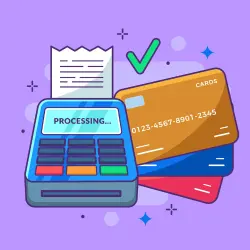TABLE OF CONTENTS
Many already know the financial challenges small- and mid-sized businesses face, but the change in Visa’s surcharge rules may add to them. Per a recent Visa notice, starting April 15, 2023, the cap on credit card surcharges is lowering from 4% to 3%. Across the United States—with the exception of Connecticut and Massachusetts, where surcharge programs are illegal—merchants can only recover a maximum of 3% per transaction, though their credit card processing fees may exceed this amount.
How Will the Changes to Visa’s Surcharge Rules Impact Business Owners?
The survival of businesses is often a numbers game, and the complex system of payment processing fees adds to the difficulty of this game. In addition to Visa’s interchange rate, merchants must also cover the interchange-plus rate charged by their payment processors. Visa’s interchange rate ranges between 1.5-3.5%, while the interchange-plus rate can range from 0.5% to as high as the financial company sees fit based on a business’s risk assessment.[1]Visa. “Visa USA Interchange Reimbursement Fees“. Accessed on April 4, 2023.

Suppose a merchant pays the lowest interchange fee (1.5%) with the lowest interchange-plus fee (0.5%). This would make a total of 2% per transaction in fees. Here, a 3% surcharge fee is more than enough to recoup business losses associated with credit card processing fees. However, payment processing involves even more costs: transaction fees, assessment fees, and authorization fees, to name a few. Not to mention, it’s extremely difficult for merchants to qualify for the lowest processing rate. Even if a merchant does qualify, everyday business practices can drive up their processing fees. These can eat away at their bottom line. It’s easy to understand why financially-strained businesses work so hard to recover their processing fees. One of the most effective recovery methods being the implementation of a surcharge on credit card payments.
The Affect on Consumers
But consumers are financially strained, too. And according to a survey by PYMENTS and Payroc, 56% of cardholders who paid a surcharge on their last purchase, would be “very” or “extremely” likely to change merchants if they were asked to pay it again.[2]PYMNTS. “What Merchants Are Doing Wrong With Credit Card Surcharges“. Accessed on April 4, 2023. By issuing small adjustments to their surcharge guidelines, card networks may preemptively quell some consumer dissatisfaction to prevent government intervention.
While the Biden Administration’s focus on regulating junk fees attempts to improve consumer satisfaction, credit card surcharges don’t count as junk fees. This crackdown on junk fees is primarily aimed at Ticketmaster and massive ticketing sites.[3]The White House. “Fact Sheet: President Biden Highlights New Progress on His Competition Agenda“. Accessed on April 4, 2023. Given the company’s record-breaking earnings of $6.3 billion in 2022, Ticketmaster will likely be able to conform to regulations on fees imposed by the public or private sector, but shouldering these costs is not a luxury every small business can afford.[4]Live Nation. “Live Nation Entertainment Reports Third Quarter 2022 Results“. Accessed on April 4, 2023.
The issue with regulation is that it can often lead to companies retaliating by passing costs down to customers. This is what happened with debit cards under the Durbin Amendment. This law has been criticized as a complete failure for both consumers and small retailers. [5]ICBA. “How Expanding the Durbin Amendment Would Further Harm Community Banks and Their Customers“. Accessed on April 4, 2023. The amendment placed a limit on the interchange fees that card networks can charge on swiped debit cards, which resulted in significant savings for big retailers like Target and Walmart. In order to recoup their costs, card networks and other financial institutions removed rewards programs from debit cards, leading consumers to use their cash-back-earning, airline-point-accruing credit cards instead. Coincidentally, Target and Walmart are backing an expansion of the Durbin Amendment that includes credit cards.
What Should Merchants Do to Comply With Changes to Visa’s Surcharge Rules?
While there is no perfect solution to this complex issue, there is another way to offset interchange fees—a cash discount program. Cash discounting is a pricing structure that charges customers a reduced price when they pay for a product with cash rather than a credit card. This might sound similar to how surcharging works but the two are different. Surcharging is the addition of a fee for a payment method, whereas cash discounting is the reduction of a price for a payment method. As the latter is essentially a marketing tactic, it’s legal in every state including Connecticut and Mississippi where surcharging is illegal.
Otherwise, merchants should prioritize adhering to Visa’s new surcharge rules. To do so, merchants must update their point-of-transaction disclosure stating the credit card surcharge amount from 4% to 3%. Failure to comply may result in fines amounting to $25,000 per month. And if non-compliance continues, that fee may increase to $100,000 and lead to account termination. Consider consulting with your merchant services provider beforehand, as they can provide the appropriate signage to comply with the surcharge rules associated with the card brands you accept.
Speaking of providers, it’s important to partner with professionals who can effectively handle these new rules for surcharging and develop a practical solution for your specific operations. At PaymentCloud, we understand life can be full of uncontrollable forces that antiquate old solutions and require new ones. We’re on top of these surcharge changes and even offer a zero-cost credit card processing program. If you’re looking for experts who understand the unique needs of businesses like yours, contact us today!





